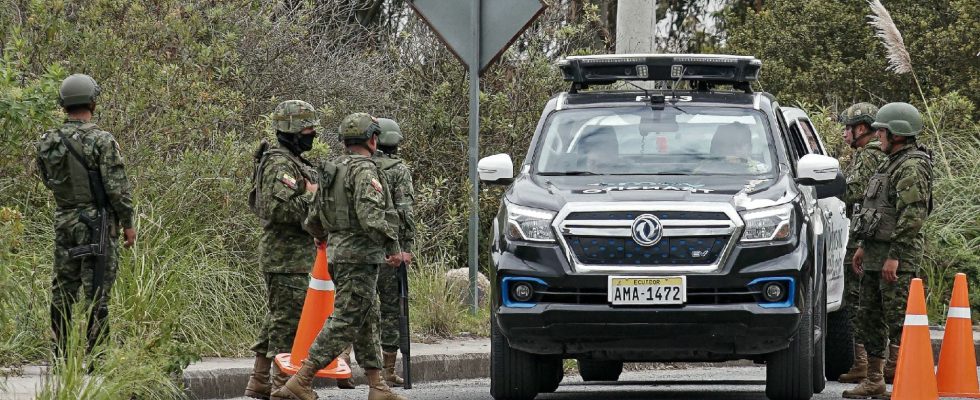Ecuador is on fire. And the situation is getting worse day by day. Hostage-taking, score-settling, car bombs… And recently, the live irruption of armed men on a television set which gave rise to lunar images. The “Little Switzerland” of Latin America fell into an unprecedented security crisis in just a few days.
The trigger comes from the spectacular escape of gang leader Adolfo Marcias, alias “Fito” this Sunday, January 7. The incident, although recurrent in the country, this time caused a surge of violence throughout the territory populated by some 18 million inhabitants. In just three days, around ten people were killed, and the authorities recorded many injured.
Faced with the scale of the attacks, newly elected President Daniel Noboa declared a state of emergency on Monday, January 10. And declared war on drug traffickers by proclaiming “internal armed conflict”. An unprecedented situation that Emmanuelle Sinardet, professor of Latin American civilization at the University of Paris Nanterre and director of the Center for Equatorian Studies within the Center for Iberian and Ibero-American Research (CRIIA), deciphers for L’Express.
L’Express: Last Sunday, Ecuador descended into chaos after the escape of Adolfo Marcias, alias “Fito”, leader of the Choneros gang. Was such a situation predictable?
Emmanuelle Sinardet: We are in a sort of continuum going crescendo. This escape is only the manifestation of a reality which has plagued the country for five or six years, and which took a chilling turn with the assassination of presidential candidate Fernando Villavicencio on August 9. This situation is summed up by a fundamental problem which concerns all public institutions: drug trafficking and corruption, both present at every level of the State. This is how drug traffickers manage to control penitentiary establishments, manipulate court decisions, influence investigations, intervene before search operations take place, etc. Before he was assassinated, Fernando Villavicencio rightly spoke of the “Narco-Estado”, the Narco-State which ended up having its skin…
Who are these drug traffickers, and what place do they occupy in Ecuadorian society?
There is a multiplicity of actors from extremely different origins, which can be observed on several scales. There are large transnational cartels present in Colombia, Europe, and Mexico. In Ecuador, there are local barons and small-time street dealers who control neighborhoods, particularly on the coast, and who often come from disadvantaged backgrounds. And finally, at the bottom of the scale, the microtraffickers who are paid by transnational gangs, not in money, but in drugs that they resell. This system inevitably generates rivalries between neighborhoods, which fuels the feeling of insecurity on a daily basis.
When did the situation start to deteriorate?
If we compare with other countries in the region, these phenomena are very recent. From 2017, episodes of violence have multiplied and become widespread. First localized in certain towns and at the borders, the violence spread to the entire coast, then to towns in the Andes, like Quito for example. But the peace agreements in Colombia, signed in 2016, constitute a breaking point insofar as they had a direct impact on the security situation in Ecuador. These agreements aimed to disarm drug traffickers. However, while some have resumed legal activities, others have found new territories in Ecuador. They settled there in the form of small, fragmented groups, very far from the model of the large cartels that we previously knew.
How is the government reacting to this unprecedented increase in violence linked to drug trafficking?
For the moment, everything is still very confusing. One thing is certain, the president promised to take control of the situation by mobilizing the armed forces on the ground. For the first time, the state goes to war with the gangs. Noboa no longer backs down from naming drug trafficking, which he describes as a cancer. The medical metaphor is often used. I am thinking in particular of the recent operation called “metastases” which led to the arrest of around thirty officials at the highest level of institutions. Among which, a police general responsible for the fight against corruption and the head of the judicial institution. However, it is obvious that a repressive policy will not be enough. We need fundamental social reforms, because street traffickers mainly come from the most disadvantaged neighborhoods. The good news is that Daniel Noboa has understood this perfectly and intends to initiate reforms which will make it possible to stem poverty within five to ten years.
What about the population? Is she used to living in a context of insecurity linked to drug trafficking?
This is a population that is not at all used to this type of situation. For a very long time, it even felt spared compared to its Colombian, Peruvian, or Mexican neighbors, even going so far as to describe Ecuador as a “haven of peace”. But little by little, Ecuadorians witnessed the emergence of score-settling under the backdrop of turf wars and control of drug marketing and export routes. The fact remains that real awareness is very recent. And was triggered by the assassination in broad daylight of the candidate for the presidential election which caused astonishment among the population.
Can the international community help the government in its fight against drug trafficking?
There are several collaboration mechanisms. I am thinking in particular of the judicial dimension and the proceedings that can be brought against transnational drug trafficking agents. There are in particular regional organizations such as the CAN (Editor’s note, Andean community). There is also the United States which says it is very concerned about the situation, and which has offered services. Note that Washington has already come to the aid of the Colombian government as part of the “Colombia Plans”. We can therefore assume that the Ecuadorian State can draw on this expertise in the fight against transnational drug trafficking to achieve a rapid return to calm.
.
